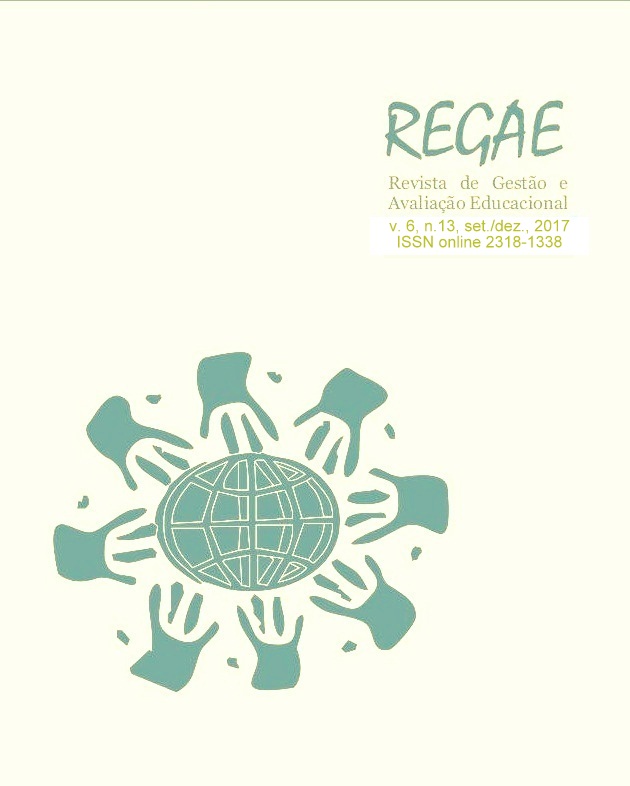Institutional evaluation: socialization of the study in the municipality of Escada/PE
DOI:
https://doi.org/10.5902/2318133826115Abstract
These studies relate do the Institutional Evaluation theme, specially to the actions developed by the City Educational Department and by the School Managers from the city of Escada/PE regarding the results from Saepe 2014. Our hypothesis starts from the point where the Education Network from Escada/PE, dealing with the results from Saepe 2014, seems to not put forward systematic and progressive actions at schools. The approach is qualitative, the type is descriptive and it was administered at the City Education Department and in two public school. The subjects were two school managers, the city manager and one technician. The instruments for collecting data were documental analyses and semi-structured interviews. The results point the fact that managers have no actions front Saepe results, most of the subjects can’t respond to what a Institutional Evaluation means and do not know the organizational structure inside the Education System of the city.
Key-words: institutional evaluation, Saepe, educational management.
Downloads
References
AFONSO, Almerindo Janela. Avaliação educacional: regulação e emancipação: para uma sociologia das políticas avaliativas contemporâneas. São Paulo: Cortez, 2009.
ANDRADE, Renato Júdice de (org.). Avaliação de competências na educação básica: um marco referencial para a prática. São Paulo: Moderna, 2011.
BRANDALISE, Mary Ângela Teixeira. Avaliação institucional da escola: conceitos, contextos e práticas. Revista Olhar de Professor, Universidade Estadual de Ponta Grossa, Departamento de Métodos e Técnicas de Ensino, Ponta Grossa, v. 13, n. 2, p. 1-16, 2010.
BRASIL. Constituição Federal, 1988.
BRASIL. Lei n. 9.394, de 20 de dezembro de 1996. Estabelece as diretrizes e bases da educação nacional. Diário Oficial da União, 23 dez. 1996.
DIAS SOBRINHO, José; BALZAN, Newton César. Avaliação institucional: teoria e experiência. São Paulo: Cortez, 2005.
ESCADA. Lei n. 2.439, de 22 de junho de 2015. Dispõe sobre o alinhamento do Plano Municipal de Educação para o Decênio 2015-2025. Escada, 22 jun. 2015.
LIBÂNEO, José Carlos. Organização e gestão da escola: teoria e prática. São Paulo: Heccus Editora. 2013.
LÜCK, Heloísa. Dimensões de gestão escolar e suas competências. Curitiba: Positivo, 2009.
LÜCK, Heloísa. Perspectivas da avaliação institucional da escola. Petrópolis: Vozes, 2012.
LÜDKE, Menga Alves; MARLI, Eliza Dalmazo André. Pesquisa em educação: abordagens qualitativas. São Paulo: EPU, 1986.
PERNAMBUCO. Nota técnica: a avaliação das escolas estaduais e o bônus de desempenho educacional - BDE. Recife: Secretaria de Estado da Educação e Cultura, 2002.
PERNAMBUCO. Saepe 2011. Juiz de Fora: UFJF, 2011.
PERNAMBUCO. Construindo a excelência em gestão escolar: curso de aperfeiçoamento Módulo XI - Monitoramento e avaliação dos processos de ensino e aprendizagem. Recife: Secretaria de Educação do Estado, 2012.
PRODANOV, Cleber Cristiano. Metodologia do trabalho científico [recurso eletrônico]: métodos e técnicas da pesquisa e do trabalho acadêmico. Novo Hamburgo: Feevale, 2013.
SANMARTÍ, Neus. Avaliar para aprender. Porto Alegre: Artmed, 2009.
SANTOS, Monalize Rigon dos; VARELA, Simone. A avaliação como um instrumento diagnóstico da construção do conhecimento nas séries iniciais do ensino fundamental. Revista Eletrônica de Educação, ano I, n. 1, 2007, p. 29-42.
Downloads
Published
How to Cite
Issue
Section
License
Authors keep copyright and concede to the magazine the right of first publication, with the work simultaneously licensed under the Creative Commons Attribution 4.0 International, non-commercial license with no derivative work, which allows to share the work with no author recognition and initial publication in this magazine.
Authors has authorization to overtake additional contracts separately, to distribute a non-exclusive version of the work published in this magazine: For example: to publish in an institutional repository or as a chapter of a book, with authorial recognition and initial publication in this magazine.
Authors are allowed and are encouraged to publish and distribute their work online. For example: in institutional repositories or in their own personal page – at any point before or during the editorial process, because this can result in productive changes, as well as increase the impact and the mention to the published work.






